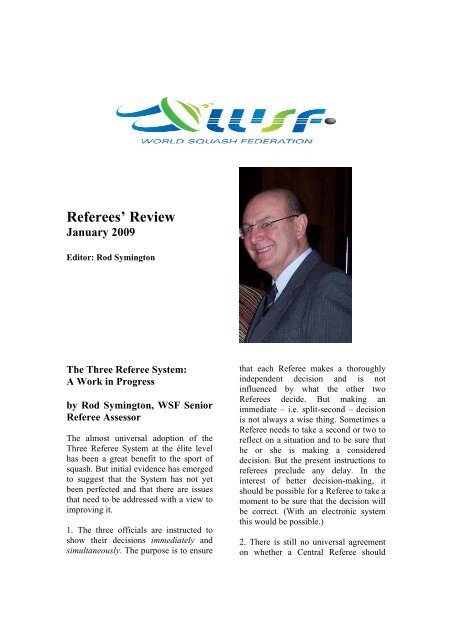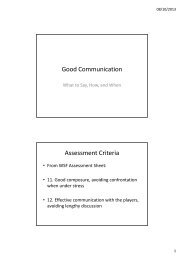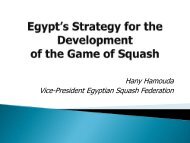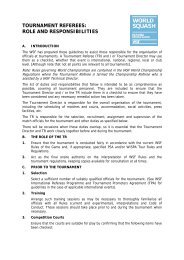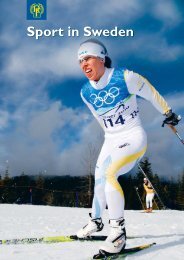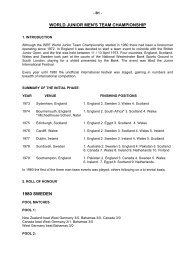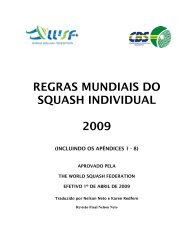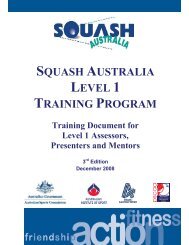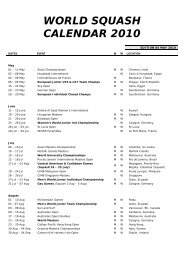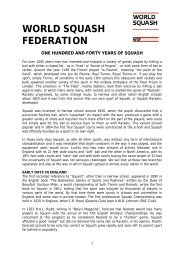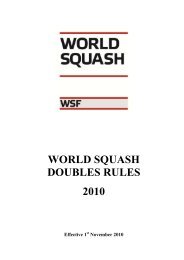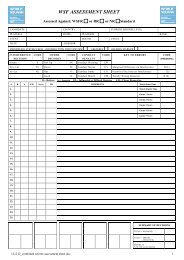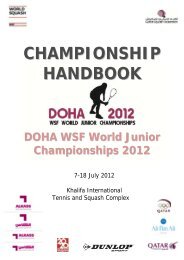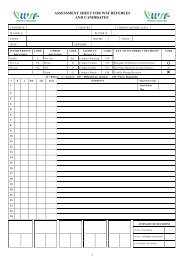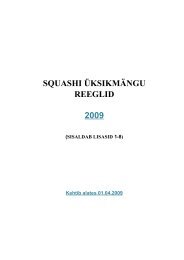Referees' Review - World Squash Federation
Referees' Review - World Squash Federation
Referees' Review - World Squash Federation
You also want an ePaper? Increase the reach of your titles
YUMPU automatically turns print PDFs into web optimized ePapers that Google loves.
Referees’ <strong>Review</strong><br />
January 2009<br />
Editor: Rod Symington<br />
The Three Referee System:<br />
A Work in Progress<br />
by Rod Symington, WSF Senior<br />
Referee Assessor<br />
The almost universal adoption of the<br />
Three Referee System at the élite level<br />
has been a great benefit to the sport of<br />
squash. But initial evidence has emerged<br />
to suggest that the System has not yet<br />
been perfected and that there are issues<br />
that need to be addressed with a view to<br />
improving it.<br />
1. The three officials are instructed to<br />
show their decisions immediately and<br />
simultaneously. The purpose is to ensure<br />
that each Referee makes a thoroughly<br />
independent decision and is not<br />
influenced by what the other two<br />
Referees decide. But making an<br />
immediate – i.e. split-second – decision<br />
is not always a wise thing. Sometimes a<br />
Referee needs to take a second or two to<br />
reflect on a situation and to be sure that<br />
he or she is making a considered<br />
decision. But the present instructions to<br />
referees preclude any delay. In the<br />
interest of better decision-making, it<br />
should be possible for a Referee to take a<br />
moment to be sure that the decision will<br />
be correct. (With an electronic system<br />
this would be possible.)<br />
2. There is still no universal agreement<br />
on whether a Central Referee should
give an explanation for a decision if a<br />
player requests one. One view asserts<br />
that the Central Referee cannot read the<br />
minds of the two other Referees and that<br />
therefore it is not possible to give the<br />
player a meaningful explanation. On the<br />
other hand, it is argued, the player can at<br />
least receive the Central Referee’s<br />
reasoning, which might be helpful (and<br />
is certainly courteous). However, this<br />
could well lead to a player’s asking the<br />
Central Referee for the latter’s reason<br />
after every decision – a habit that<br />
undermined the previous experiment<br />
with a Three Referee System. (Again,<br />
with an electronic system this problem<br />
would disappear because the player<br />
would not know how the three Referees<br />
voted.<br />
Under what circumstances, if any,<br />
should the Central Referee give an<br />
explanation? Or should every squash<br />
match be played in silence?<br />
3. At the <strong>World</strong> Championships in<br />
Manchester in October some observers<br />
remarked that there were some matches<br />
where the Three Referee System simply<br />
“didn’t work”. These included matches<br />
where a player was resorting to unfair<br />
tactics (short of misconduct) and where a<br />
single Referee would have been able to<br />
take some corrective action. What, for<br />
example, does the Central Referee do<br />
when he or she perceives that a player is<br />
blocking, but the other two Referees do<br />
not? What happens when the two players<br />
are constantly running into each other?<br />
How much power, if any, should the<br />
Central Referee be given to “direct” a<br />
match, by giving instructions to the<br />
players? What if the two other Referees<br />
don’t agree with those “instructions”?<br />
There may be issues other than these<br />
three that need to be addressed. But in<br />
any case it is obvious that the Three<br />
Referee System needs further debate and<br />
possible refinement.<br />
2009: The Year of the Rules?<br />
Yes, according to Don Ball, Chair of the<br />
Working Group that has been attempting<br />
to simplify the wording of the current<br />
Rules for so long now, its members have<br />
almost all retired from full-time<br />
employment and can now devote their<br />
whole lives to completing the project.<br />
Draft #376 is now being circulated, and<br />
the Working Group hopes to be able to<br />
send out a final draft to Member Nations<br />
in the next few months.<br />
But don’t hold your breath…<br />
In the meantime it would be appropriate<br />
for referees and other interested parties<br />
to hold discussions about possible<br />
proposals for Rule changes. At some<br />
time in the not-too-distant future<br />
Member Nations will be invited to<br />
submit such proposals.<br />
The mandate of the Working Group was<br />
to produce a version of the Rules in<br />
simplified English (not an easy task).<br />
Proposals for actual changes to the Rules<br />
need to come from Member Nations.<br />
[Ed.]
Reappointments 2008<br />
Following the review of applications<br />
received by the deadline of May 31,<br />
2008 by the WSF Referee <strong>Review</strong><br />
Board, the Management Committee of<br />
the WSF confirmed the following<br />
reappointments:<br />
<strong>World</strong> Referee<br />
John Massarella<br />
Mike Riley<br />
International Referee<br />
David Atkins<br />
Mike Collins<br />
Wendy Danzey<br />
Barry Faguy<br />
Jamshed Gul Khan<br />
Ayaz Khan<br />
Tahir Kanzada<br />
Munir Shah<br />
Yogi Singh<br />
A complete list of WSF Referees can be<br />
found on the WSF website.<br />
Applications for Appointment as<br />
International or Re-Appointment<br />
as <strong>World</strong> or International<br />
Referee<br />
1. The application deadline is Sunday,<br />
May 31, 2009.<br />
2. All candidates must be nominated by<br />
their National Association.<br />
3. Candidates should familiarise<br />
themselves with the requirements for<br />
WSF <strong>World</strong> and International Referee<br />
that can be found on the WSF Website<br />
under “CBTA Programmes”. In<br />
particular, candidates should pay close<br />
attention to the criteria relating to<br />
activity and assessments. Please note: an<br />
application that does not meet these<br />
minimum requirements will not be<br />
considered.<br />
4. All information should be submitted<br />
in electronic form.<br />
5. Application forms and instructions are<br />
available from the WSF Office.<br />
PetroSport Open, Cairo, Egypt,<br />
28 July–4 August 2008<br />
by Damien Green, International<br />
Referee<br />
I like to sit and listen to the more<br />
experienced referees on the tour talk<br />
about their past experiences. Invariably,<br />
the talk turns to their experiences<br />
refereeing tournaments in Egypt and<br />
how the crowds there can be quite<br />
‘enthusiastic’ in their support of local<br />
players. Many consider it one of the<br />
toughest tests for a <strong>Squash</strong> Referee to<br />
come out of a tournament in Egypt alive.<br />
(O.K., that’s a little bit of an<br />
exaggeration!)<br />
I was recently invited to the PetroSport<br />
Open in Cairo, and jumped at the chance<br />
to referee at a tournament in that city.<br />
PetroSport is a new Super Series event<br />
in Cairo, which was held at the Sky<br />
Sports Club. This is a fantastic multisports<br />
venue quite a way outside of<br />
central Cairo. It is in a developing
suburban area with many, many houses<br />
and buildings still being built, so driving<br />
through the streets to the venue felt a<br />
little like driving through a ghost town.<br />
The upside being that we didn’t get<br />
involved in any of the legendary Cairo<br />
traffic jams. There were six courts at the<br />
venue plus the perspex portable court.<br />
Four of the permanent courts backed<br />
onto an outdoor court yard and were<br />
very exposed to the heat, but thankfully<br />
all early round play was on the two<br />
courts fully inside and air conditioned.<br />
Players, referees and administrators were<br />
accommodated at the Le Passage motel<br />
very close to Cairo airport. The motel<br />
was magnificent with all the facilities<br />
you could ever need. I even managed to<br />
get a bit of a trim done on the little bit of<br />
hair that I have left. The motel was<br />
however about thirty minutes drive from<br />
the squash venue, but a reliable and<br />
frequent bus service was provided.<br />
Nasser Zahran and Wendy Danzey were<br />
the other two WSF referees on duty with<br />
Nasser taking on the Tournament<br />
Referee role. The qualifying rounds and<br />
early main draw rounds were quite busy<br />
for us as the three referee format was in<br />
operation from day one. We were ably<br />
assisted by a number of local referees<br />
and the players also took turns in the<br />
side referee seat for a number of the<br />
early matches.<br />
There really were some magnificent<br />
matches early in the main draw with the<br />
standouts for me being, lucky loser<br />
Steve Coppinger putting in a huge effort<br />
to just go down to Hisham Ashour in the<br />
fifth game, and by far the biggest upset<br />
in the tournament, Tarek Momen<br />
overcoming number two seed Gregory<br />
Gaultier in an incredible five-game<br />
effort in front of very partisan home<br />
crowd. The main disappointment for the<br />
Egyptian spectators was Ramy Ashour<br />
having to pull out after his first-round<br />
match with an injury.<br />
As the tournament moved into its latter<br />
stages the portable court was used in the<br />
evenings; it was a bit too hot to play on<br />
it during daylight hours. The<br />
quarterfinals produced some great<br />
matches with Azlan Iskander finally<br />
ending Tarek Momen’s incredible run,<br />
but he took five games to do it.<br />
Unfortunately, both Semi Finals<br />
produced a retirement because injury to<br />
one of the players, most likely a<br />
symptom of how hard this sport is on the<br />
players’ bodies when they have to<br />
compete in close matches for several<br />
days running. This left an all-Egyptian<br />
final with Karim Darwish playing Wael<br />
El-Hindi. Quite a large crowd witnessed<br />
the final, but because two locals were<br />
playing they were quite subdued as they<br />
didn’t have a favourite to support. Wael<br />
ended up winning the match in four<br />
games but it was not the greatest <strong>Squash</strong><br />
spectacle ever, as there was quite a bit of<br />
body contact and lots of lets asked for,<br />
but well done to Wael.<br />
Outside the play itself it was great to see<br />
the new PSA Chief Executive Officer<br />
Richard Graham at the tournament along<br />
with Alex Gough. Both were very happy<br />
to sit and chat about <strong>Squash</strong> in general<br />
but they were also quite interested to<br />
hear about any issues from a refereeing<br />
perspective.<br />
Wendy and I did get some time to get<br />
out and about and see the sights of<br />
Cairo. The Pyramids and Sphinx were<br />
just unbelievable and the Cairo Museum<br />
was also fantastic, especially the
Tutankhamen exhibition. We also did a<br />
bit of shopping at the Malls and old<br />
markets.<br />
The tournament administration team<br />
kept everything running smoothly right<br />
from the Chairman Hady Samir Fahmy<br />
and tournament director Adel Naser<br />
down to the office staff of Ahmed,<br />
Tamer and Shimaa amongst others.<br />
Robert Edwards was the technical<br />
director and MC and did a magnificent<br />
job as usual.<br />
Personally I would like to thank Robert,<br />
Wendy, Nasser and Fram and Paul Selby<br />
for their company and conversation<br />
throughout the tournament.<br />
I don’t think I got the full Egyptian<br />
experience this time around as far as the<br />
crowds go, because a large number of<br />
local players were involved and some<br />
untimely injuries curtailed some of the<br />
matches, but it was certainly an<br />
experience I really enjoyed. I would<br />
encourage any referees to travel to Egypt<br />
if the opportunity ever arises.<br />
Singapore Women’s Masters, 28<br />
July–2 August 2008<br />
by Mike Collins, International<br />
Referee<br />
I was very pleased to learn that<br />
Singapore were again hosting the CIMB<br />
Singapore Women's Masters and to be<br />
invited to officiate. Singapore is a<br />
wonderful city to visit and especially<br />
when you are looked after so well by the<br />
local residents such as Munir Shah and<br />
Desmond Hill and, in fact, everyone you<br />
work with. Most of the top-ranked ladies<br />
were present to contest the title and there<br />
were 2 rounds of qualification for the<br />
hopefuls wishing to make an impact in<br />
the main draw. Munir and I shared the<br />
refereeing duties, most ably assisted by<br />
the local referees, and we were all<br />
extremely impressed by the competitive<br />
and yet sporting manner in which the<br />
players conducted themselves. There<br />
were one or two surprises with some top<br />
seeds exiting early, such as Natalie<br />
Grinham and Shelley Kitchen, but it<br />
became almost inevitable that Nicol<br />
David would continue her dominant<br />
streak and contest the final against the<br />
other Grinham, Rachael. The final was<br />
well attended with a capacity crowd who<br />
were entertained by a match which saw<br />
Rachael controlling matters in the first<br />
game to take it 11/8 but then Nicol<br />
patiently playing her game to take the<br />
next 3 games 11/3 11/5 and 11/8 to win<br />
the title in 4. Whilst the squash was<br />
great, the local sights and sounds and<br />
tastes of Singapore were as great, and I<br />
can fully appreciate why this event is<br />
destined to become a permanent and<br />
popular feature on the <strong>Squash</strong> Calendar.<br />
<strong>World</strong> Masters Championships,<br />
Christchurch, New Zealand, 19-<br />
25 October 2008<br />
by Munir Shah, International<br />
Referee<br />
This was a memorable event that was<br />
quite different from most open squash<br />
championships in the world. Yes, I am<br />
talking about the <strong>World</strong> Masters, which<br />
is meant for die-hard squash players who<br />
are above 35 years of age. If ever you<br />
think that you are in the twilight of your<br />
lives, think again. The Masters gives you<br />
the opportunity to revive your compet-
itive spirit so that you can gauge your<br />
standard against players of the same<br />
vintage.<br />
New Zealand made history by hosting<br />
the event for a second time, after having<br />
had the honour of inaugurating the first<br />
<strong>World</strong> Masters way back in 1991.<br />
The Organizing Committee headed by<br />
Barry Gardiner, who incidentally won<br />
the Men’s Over-70 final, did a fabulous<br />
job in ensuring that everyone had a<br />
minimum of 3, if not 4 matches, in the<br />
tournament. The Championship Referee,<br />
Ian Gardiner, had an enormous task in<br />
managing more than 450 matches,<br />
involving 769 players from 35 countries!<br />
Mohamad Fayyaz of Hong Kong and I<br />
were the 2 WSF International Referees<br />
assigned to the championships,<br />
complemented by NZ Referees and<br />
some visiting Canadian National<br />
Referees, many of whom took part in the<br />
championships too.<br />
The arrangement of requiring players to<br />
mark and referee matches, after they’ve<br />
played their respective matches, was a<br />
resounding success. I did not witness a<br />
single complaint by these players when<br />
they were called upon to officiate the<br />
following matches. In the early rounds<br />
the assigned referees were called upon to<br />
officiate seemingly “difficult matches”<br />
but this turned out to be an anti-climax. I<br />
found it a joy in all honesty because the<br />
players were generally very sporting in<br />
accepting the referees’ decisions. On the<br />
final day all matches were handled by<br />
the WSF International Referees and NZ<br />
National Referees.<br />
A total of 6 club venues were used<br />
during the championships and what<br />
captivated me was the army of<br />
volunteers who helped out in the venue<br />
co-ordination, administration, transportation<br />
and even catering services. The<br />
organisers also made sure that there was<br />
a good spread of the various agecategory<br />
matches (Men and Women) at<br />
these venues. It was only on the last day<br />
of the championships that all the final<br />
matches were played at the Christchurch<br />
<strong>Squash</strong> Club.<br />
The Opening Ceremony was a colourful<br />
event which saw the participants<br />
marching down from the Bridge of<br />
Remembrance in downtown to the<br />
Christchurch Town Hall. Mid-way<br />
through the championships, there were<br />
opportunities for players and officials to<br />
learn a bit about the country’s history at<br />
the Tamaki Heritage Village and soak in<br />
the Kiwi party atmosphere at The Holy<br />
Grail.<br />
The Farewell celebration dinner and<br />
prize presentation was a huge party at a<br />
unique venue, The Air Force Museum at<br />
Wigram Airbase. Former Women’s<br />
<strong>World</strong> No.1, Susan Devoy, and WSF<br />
Emeritus President Susie Simcock<br />
graced the occasion. I have never seen<br />
such an enthusiastic bunch of party<br />
animals, who were quick to go on to the<br />
dance floor soon after the initial<br />
cocktails. They showed how fit they<br />
were by jiving along with the band,<br />
whose choice of music ranged a few<br />
decades from the 60s onwards.
From the Director …………<br />
by Graham Waters<br />
We have had a very busy second half of<br />
2008, with most WSF Referees being<br />
assigned to at least one event and many<br />
to more than that. This busy time was in<br />
spite of the postponement of both the<br />
Abu Dhabi Open and the <strong>World</strong> Doubles<br />
in Chennai, the downgrading of the<br />
Pakistan Open to a 3-star event, where<br />
they used their own referees, and two<br />
events traditionally held during this<br />
period (U.S. Open and English Open)<br />
not being held this year.<br />
There were certainly challenges in trying<br />
to find a sufficient number of referees<br />
available to meet all of the requests that<br />
we received, so we resorted to several<br />
different tactics to meet the demand. In<br />
some cases, referees were asked to do<br />
back-to back events, in others we<br />
employed some of our Assessors, who<br />
are “retired” referees, to act as Side<br />
Referees during early rounds before<br />
going back to being a full time Assessor<br />
during the latter rounds. For the<br />
University Championships in Cairo in<br />
August, we could not find enough<br />
referees from areas that the hosts were<br />
willing to fund airfares, so we invited<br />
two European Regional Referees to<br />
satisfy the request. Please see the<br />
accompanying chart to see who was<br />
assigned to which events in the second<br />
half of 2008.<br />
There are still one or two WSF Referees<br />
who cannot seem to fulfil a commitment,<br />
and back out of events at the last minute.<br />
This is not fair to the promoters who are<br />
then left short, nor to other WSF<br />
Referees who may have been able to<br />
accept the assignment. I would implore<br />
all of us to honour our commitments.<br />
As you all probably know by now, the 3-<br />
Referee System is mandatory for all PSA<br />
Super Series events, including all<br />
qualification matches. The PSA also<br />
envision it becoming mandatory for all<br />
PSA events in the longer term. WISPA<br />
has also made the system mandatory, for<br />
all matches played on a glass-back court.<br />
We have had discussions with both PSA<br />
and WISPA and have now issued a<br />
document “Guidelines for the use of the<br />
3-Referee System” that has been<br />
approved by all 3 governing bodies.<br />
As a result of the CBTA being adopted<br />
by ManCom, we have a new revised<br />
Assessment Form, and all of the existing<br />
WSF Assessors have to undertake a<br />
seminar to ensure that they are using the<br />
new criteria. As reported in the last<br />
issue, Chris Sinclair and Rod Symington<br />
have been named as “Senior Assessors”<br />
and have been conducting those<br />
seminars and evaluating the Assessors.<br />
To this point, 10 of the existing<br />
Assessors have completed this training<br />
with 3 still to do so.<br />
You may have noticed that the WSF has<br />
adopted a new logo recently. That means<br />
that we must have new uniforms (polo<br />
shirts, sweaters (jumpers), and crests for
our blazers), and I hope that will be<br />
sorted out during the early part of the<br />
new year.<br />
2009 appears to be a another busy year<br />
with new events in Mexico City,<br />
Hurghada, and Abu Dhabi (postponed<br />
from December) in the first half, and the<br />
<strong>World</strong> Games in the second half of the<br />
year, in addition to most of the longstanding<br />
events and the upcoming <strong>World</strong><br />
Championships in India, the Netherlands,<br />
Denmark, and Kuwait.<br />
This is all good news, but perhaps the<br />
best news of all is that Lorraine Harding<br />
will be returning to the WSF Office in<br />
January 2009. Perhaps now we can all<br />
get back to normal!<br />
As always, your comments and<br />
suggestions on any aspect of our<br />
program are always welcome. I look<br />
forward to catching up with many of you<br />
during what is shaping up to be another<br />
busy year in 2009.<br />
WSF Referee Assignments – 2nd half 2008<br />
(A) – Assessor Assignment<br />
July 27<br />
- Aug.<br />
8<br />
July<br />
28–A2<br />
July<br />
28–A4<br />
Aug.<br />
22-28<br />
Sept.<br />
13-14<br />
Oct.<br />
11-19<br />
Oct.<br />
17-25<br />
Oct.<br />
25-31<br />
Nov.<br />
8- 15<br />
Nov.<br />
17-23<br />
Nov.<br />
30 –<br />
Dec. 6<br />
<strong>World</strong> Junior Men Zurich 4 Clayton, Khanzada, Parker (R/A),<br />
Aarts (Individual) Massarella (Teams)<br />
CIMB Singapore<br />
Masters<br />
SKY Petrosport<br />
Open<br />
<strong>World</strong> University<br />
Championships<br />
Refereeing Clinic<br />
Men’s &<br />
Women’s <strong>World</strong><br />
Open<br />
Singapore 2 Collins, Shah<br />
Cairo 3 Zahran, Danzey, Green,<br />
Cairo 4 Aarts, Khanzada, Marco Potgorsek<br />
(Slovenia, ESF), Joss Garvey<br />
(England)<br />
Lagos, 1 Parker (A)<br />
Nigeria<br />
Manchester 8 Allanach, Atkins, Clayton, Gingell,<br />
Riley, Parker, Massarella, Waters,<br />
Symington (A)<br />
<strong>World</strong> Masters Christchurch 2 Shah, Fayyaz<br />
Qatar Classic Doha 9 Ayaz Clayton, Collins, Danzey,<br />
Faguy, Massarella, Sinclair, Waters,,<br />
Flynn (A)<br />
Pakistan Open Islamabad Downgraded to 3 Star event – no<br />
referees requested<br />
Hong Kong Open Hong Kong 6 Bowlt, Gingell, Fayyaz, Sinclair,<br />
Women’s <strong>World</strong><br />
Team Championships<br />
Singh, Fahim<br />
Cairo 6 Allanach, Atkins, Fayyaz, Jamshed,<br />
Singh, Zahran
Dec. 4-<br />
11<br />
Dec.<br />
14-19<br />
Dec.<br />
15-20<br />
Abu Dhabi Open Abu Dhabi POSTPONED until mid-2009<br />
Saudi<br />
Al-Khobar 4 Gingell, Massarella, Aarts, Zahran<br />
International<br />
<strong>World</strong> Doubles Chennai POSTPONED<br />
<strong>World</strong> Junior Men’s Championships,<br />
Zurich, 27 July–August 8<br />
2008<br />
by Dean Clayton, International<br />
Referee<br />
The <strong>World</strong> Junior Men’s Championships<br />
may not have the prize fund of the Saudi<br />
International, but it’s a <strong>World</strong><br />
Championship after all, and as with<br />
many of the other events to which I’ve<br />
been invited, I’d never been to Zurich<br />
before so this was an excellent<br />
opportunity to visit. While I did go on a<br />
school trip to Vitznau near Lucerne in<br />
the early sixties, that’s probably timebarred<br />
by now and so doesn’t count.<br />
The flight into Zurich from Heathrow<br />
was pretty uneventful until the final<br />
approach. We later found that we had<br />
been stacked and had to circle Lake<br />
Lucerne three times because of a local<br />
thunderstorm over the airport, though the<br />
weather outside the aircraft was fine.<br />
Still, better safe than sorry, even if we<br />
were delayed for a while.<br />
We were treated very well right from our<br />
arrival, starting with being met at the<br />
airport by Jasmin, the transport coordinator,<br />
who was holding up a monster<br />
squash racket so we couldn’t miss her. I<br />
like to think I’m not the only one who’s<br />
recognised someone but not remembered<br />
where from, but she was kind enough to<br />
remind me that she had played in the<br />
British Junior Open in Sheffield so that<br />
was one problem solved. Off we went to<br />
the hotel, not the main one where most<br />
of the players stayed but a little further<br />
away and probably quieter because of<br />
that. Tony Parker solved the problem of<br />
who would have the bigger of the two<br />
beds in our apartment by taking the<br />
smaller one into the kitchen so that he<br />
could sneak outside onto the balcony for<br />
a smoke when he wanted to. Perhaps<br />
more importantly, it also saved him from<br />
being disturbed by my snoring so we<br />
killed two birds with one stone.<br />
The majority of the squash was played at<br />
the Vitis sports centre in Schlieren, and<br />
straightaway Micky Mueller and his<br />
team made us very welcome, and by that<br />
I mean we truly felt part of the event<br />
rather than a tolerated but nevertheless<br />
unwelcome evil. As another example of<br />
just how small the squash world is, the<br />
tournament referee was John Williams<br />
who I had last seen in Amsterdam in<br />
April and before that playing in a<br />
Middlesex Open in the nineties. He did a<br />
fine job as far as most of us were<br />
concerned, as did his very able assistant<br />
Daniel who, with typical Teutonic<br />
efficiency, made sure that marking<br />
sheets, balls and players’ name and<br />
match cards were always to hand in<br />
good time, which was a tremendous help<br />
for us. Another high spot for us, culinary<br />
this time, was the meal we were treated<br />
to in Daniel’s restaurant in Zurich. Quite
apart from his administrative abilities, he<br />
is also a top class chef and served up a<br />
truly gourmet meal for us. The lime<br />
risotto in particular drew many<br />
compliments and I believe he was even<br />
persuaded to part with the recipe.<br />
The first round of group matches in the<br />
team event was played at the Vitis centre<br />
while the second and third rounds took<br />
place at various clubs in the surrounding<br />
area. Each had arranged hospitality on<br />
the Saturday evening for everyone<br />
involved, including the referees, and we<br />
were all very well treated. The luckiest<br />
were taken to see the Rhine Falls and<br />
truly spectacular they were too, by all<br />
accounts.<br />
The most surprising aspect of the whole<br />
trip (for me at least) was the weather. I<br />
wouldn’t normally complain about good<br />
weather but it must have been one of the<br />
hottest two-week periods since records<br />
began and certainly belied my idea of<br />
Switzerland as a cool country.<br />
Unfortunately, there was no airconditioning<br />
in any of the venues<br />
(unnecessary because it’s normally quite<br />
mild) so it was desperately<br />
uncomfortable until industrial fans were<br />
brought in to the Vitis centre. They<br />
helped to a large extent but it was still<br />
extremely hot and humid. How the<br />
players coped with it and yet played so<br />
well still amazes me. One of the German<br />
lads sweated so much, he literally filled<br />
his boots to overflowing and had to find<br />
some different shoes to avoid making the<br />
court unplayable.<br />
The event itself was very hard work with<br />
so few referees. Necessarily, the days<br />
tended to be rather long because of the<br />
statutory rest periods for the players, but<br />
it did give those who wanted to the<br />
chance to sit in the sun and watch the<br />
trains go by on the eight tracks that ran<br />
just over the road from the club. As with<br />
pretty well all things Swiss, they were<br />
very punctual. Even the coach drivers<br />
who transferred us between the hotel and<br />
the sports centre joined in, so much so<br />
that Tony Parker was very close to being<br />
left behind one day and one of the<br />
Cayman Islands players actually was.<br />
Luckily for his team, he didn’t miss his<br />
match, but it must have been a close<br />
thing. Micky Muller’s father helped<br />
organise the transport to and from the<br />
hotels as well and always made sure we<br />
were given priority treatment when he<br />
could. Even so, the French boys tried<br />
very hard to get to the front seats before<br />
we could and did actually succeed once.<br />
A little threat to deal with them severely<br />
on the squash court soon put paid to that<br />
though (just a joke). It was interesting to<br />
see the snow-capped Alps sometimes<br />
from the coach in the morning, and as<br />
well as that spectacular sight, there were<br />
foxes and a wild boar in the fields and<br />
birds of prey soaring overhead. All this<br />
and squash as well!<br />
The schedule allowed a day off between<br />
the individual and team events when<br />
various trips were organised. Some of us<br />
chose to go to Lucerne where most took<br />
a commercial boat trip round part of<br />
Lake Lucerne. Tony Parker and Mary<br />
Scott-Miller were brave enough to hire<br />
their own little cruiser and saw places<br />
that the rest of us missed and I don’t<br />
suppose they even argued about who<br />
should drive. Others ventured further<br />
afield and went to Mount Pilatus. They<br />
must have taken plenty of warm clothes<br />
as we didn’t hear of any frostbite<br />
problems.
The organisers were generous enough to<br />
host two Championships dinners and<br />
very entertaining they were too. After<br />
the individual event, one of the<br />
entertainers was a local Alphorn player.<br />
He very kindly invited Nicholas Muller<br />
and Mohammed El Shorbagy to test their<br />
skills. Nicholas put in a creditable<br />
performance and actually managed a<br />
note or two (as you might expect) while<br />
it’s fair to say that Mohammed did his<br />
best. The second dinner had many of the<br />
players enthralled, and probably many of<br />
the managers, coaches and<br />
physiotherapists too, as a troupe of<br />
Brazilian samba dancers put on a<br />
memorable routine. One of the French<br />
boys was especially keen to get<br />
involved. Whether it was recorded for<br />
posterity we may never know, but he<br />
certainly seemed to be enjoying himself<br />
on the stage.<br />
Then it was all over, yet another event<br />
consigned to memory. I’d like to thank<br />
all the referees there who made it an<br />
enjoyable experience, even those who<br />
complained because they didn’t get what<br />
they saw as the top jobs. To them, I<br />
would only say that someone has to do<br />
each match (I was happy to do Ireland v<br />
Ecuador on the last day for 25th place)<br />
and one day, if they keep trying,<br />
listening and taking notice, perhaps<br />
they’ll be pleased with what they are<br />
asked to do rather than jealous. Other<br />
than that, I think we generally had at<br />
least as good a time in Zurich as<br />
anywhere else and probably better than<br />
many.<br />
2-Day Officiating Course,<br />
Lagos, Nigeria<br />
13–14 September 2008<br />
by Tony Parker, WSF Assessor<br />
It was with some trepidation, and not<br />
without quite a few people saying I must<br />
be mad, that I accepted the invitation<br />
(thanks, Graham) to hold a 2-day<br />
officiating course for the Nigerian<br />
<strong>Squash</strong> <strong>Federation</strong> in Lagos.<br />
After acceptance of this assignment I<br />
received a call from Sonny Obot, the<br />
Secretary General of the Nigerian<br />
<strong>Squash</strong> <strong>Federation</strong>, asking if I had<br />
booked my flight and applied for the<br />
visa. I explained that at this time the<br />
flights would cost £690 and until they<br />
had paid money to the WSF, I would not<br />
be able to book the flights. As no money<br />
had been received after 10 days, I<br />
phoned Sonny on his mobile to tell him.<br />
A few days later the WSF received half<br />
the amount required, and Sonny<br />
explained that there was confusion as to<br />
whether it was dollars or pounds. Again,<br />
no additional money was received and<br />
Sonny blamed the bank that said there<br />
had been a fault that stopped them<br />
sending it. Eventually it arrived but by<br />
now the flight cost had risen to £1067<br />
and I would have to return 2 days after<br />
the course.<br />
The WSF officer, John, alone most of<br />
the time, helped tremendously and my<br />
ticket was booked. Unfortunately,<br />
despite valiant efforts by Tracy to pay<br />
using the WSF credit card, it was<br />
apparently a rule that only the person<br />
travelling to Nigeria could pay the fare. I
went into my local travel agent who told<br />
me that they couldn’t take the money for<br />
BA, as BA didn’t use agents. I rang BA<br />
and was told to go the airport to pay the<br />
fare. After queueing at the desk for forty<br />
minutes, I was told that they could not<br />
accept payment for flights to Nigeria<br />
with either credit or debit cards; I would<br />
have to pay cash – and the reservation<br />
was only on hold for another 12 hours.<br />
On Saturday morning I went to my bank<br />
and withdrew £1100 (fortunately, I<br />
happened to have this amount available),<br />
and went yet again back to the airport<br />
and finally I got my ticket.<br />
I then discovered that there is only one<br />
Nigerian High Commission in England<br />
and that was in London! By now, it was<br />
only 17 days before I was due to go.<br />
Until the money had been paid in full by<br />
the Nigerian Association, the WSF and I<br />
agreed it was not appropriate to spend<br />
any more money. Nevertheless, I<br />
downloaded a visa application from the<br />
High Commission’s web-site and duly<br />
sent it off in the manner required with<br />
the £70 fee. When it came to following it<br />
up, I listened to the 3-minute<br />
introduction to the Embassy only to be<br />
cut off after another 30 seconds of<br />
pressing the visa option. I decided to try<br />
a different approach and keyed the<br />
number for the library. To my<br />
amazement, the officer in charge of<br />
postal visa applications answered the<br />
phone. He had gone there for some<br />
peace and quiet! Now only 8 days to go!<br />
He said he had the application, but they<br />
required a prepaid special delivery<br />
envelope to send it, and I had provided<br />
only a “recorded delivery” envelope<br />
which was what was stated in the visa<br />
application form. I duly bought this (for<br />
another £4), and sent it special delivery.<br />
He later confirmed receipt of my<br />
application and promised to return my<br />
passport on the Wednesday before the<br />
flight which was due to go on the Friday.<br />
I told Sonny Obot, who reminded me<br />
that the Nigerian High Commission was<br />
staffed by Nigerians and not by British<br />
personnel and he would send an e-mail<br />
to stress the urgency. We were both<br />
relieved when the postman delivered the<br />
visa on the day before my flight...<br />
I was already plagued with a stomach<br />
bug before I went, so I had a most<br />
uncomfortable 7-hour flight on a 747-<br />
400.<br />
On arrival, after 30 minutes queuing, I<br />
reached the immigration desk, only to be<br />
told that I would not be allowed to enter<br />
because I had not given them an address<br />
where I was staying. I had asked Sonny<br />
for this, but he had not provided it. I told<br />
the immigration officer that I was being<br />
met by the person who knew this, and<br />
eventually he rang Sonny who provided<br />
the details and I was allowed in. Sonny<br />
was only on the other side of the desk,<br />
but of course I didn’t know what he<br />
looked like! The plane had landed at<br />
7pm and Sonny waited with me until my<br />
luggage appeared at 9pm. Welcome to<br />
Lagos!<br />
Outside the airport were 2 other<br />
officials, the president and a vicepresident<br />
of the Nigerian <strong>Squash</strong><br />
<strong>Federation</strong>, and I was given a most warm<br />
welcome. The car was parked about ¼<br />
mile away on what was no more than a<br />
large area of unsurfaced waste-land on<br />
which cars were parked all over the<br />
place. This was Lagos airport’s car park!<br />
After a 40- minute drive through the<br />
traffic on roads where pot-holes were<br />
feet deep and amongst people pushing<br />
carts and balancing anything from
askets of fruit to what looked like<br />
dustbins full of all sorts on their heads,<br />
we reached my accommodation.<br />
We passed an Intercontinental Hotel, but<br />
Sonny explained he had some<br />
guesthouse for me that would be<br />
completely safe and secure. Having<br />
traversed some unmade back streets<br />
littered with stalls, hawkers and beggars,<br />
we reached the Allure Guest House,<br />
which was a small enclave surrounded<br />
by razor wire and huge iron gates.<br />
I was greeted warmly and taken to my<br />
room which was spacious and had a<br />
plasma TV. I settled in, unpacked and<br />
decided to use the ensuite bathroom.<br />
Alas there was no bath plug and I<br />
couldn’t turn the handle to make the<br />
shower work, so I rang for help. I<br />
explained the problem to the night<br />
manageress, who was a charming lady<br />
call Nneka and she came with a spanner<br />
to turn the tap for the shower.<br />
Unfortunately the connections were<br />
loose and the water simply ran down the<br />
hose and went straight through some<br />
holes at the back of the bath. She then<br />
went to fetch a plug so I was able to fill<br />
the bath and at last feel comfortable. By<br />
now it was nearly midnight and Sonny<br />
told me that I was due to be at the radio<br />
station at 8am for a programme to be<br />
broadcast live at 8.20, so he would pick<br />
me up at 7, as it was about an hour’s<br />
journey to the station. The course was<br />
due to start at 9.30 in the complex that<br />
was adjacent to the main football<br />
stadium.<br />
I got to the course at 9.40 and there was<br />
a long queue of people registering with<br />
the official staff for the event. After an<br />
adventurous visit to the loo, I returned<br />
and found that 36 Nigerians were ready<br />
and waiting for me to start. I was given a<br />
most wonderful introduction and was<br />
warmly welcomed by all attendees. I had<br />
asked beforehand for a flip-chart and<br />
equipment to show videos and DVDs.<br />
Flip-charts I find most useful, as you can<br />
easily recap a point you have made<br />
earlier when questions are asked. Alas,<br />
no flip-chart and no DVD equipment<br />
either, but I was provided with a<br />
blackboard and some chalk – but you<br />
can’t go back then so easily.<br />
I believe that no session should last<br />
longer than 1½ hours before a break.<br />
There was no provision for tea or coffee,<br />
but bottles of water were supplied and<br />
everyone wanted to carry on. It soon<br />
became evident that Nigeria’s absence<br />
from the <strong>World</strong> <strong>Squash</strong> scene for many<br />
years resulted in their marking<br />
terminology to be both out of date and in<br />
many ways peculiar to Nigeria. For<br />
example, any ball ‘not good’ – whether<br />
‘down, not up or out’ – was called<br />
‘down ball’. They did not award a stroke<br />
but a ‘rally’; and ‘5 all’ was ‘five, five’.<br />
When the server won the point, it was<br />
‘hand in’ and ‘no call’, or ‘hand out’<br />
when the server lost the point.<br />
After three hours I assumed it was<br />
lunchtime, but again nothing had been<br />
arranged. Eventually, I was given a<br />
sandwich of unknown content and<br />
another bottle of water. Everyone<br />
seemed to want to carry on, but I insisted<br />
I needed a break, to have a cigarette if<br />
nothing else, so half an hour later we<br />
were in session again. It seems that they<br />
wanted their money’s worth as everyone<br />
had paid the equivalent of £70 to attend<br />
– for which they also received a T-shirt<br />
and a rather nice hold-all, both bearing<br />
the motif ‘Nigerian <strong>Squash</strong> <strong>Federation</strong>, 2<br />
day Officiating Course, under the
auspices of the <strong>World</strong> <strong>Squash</strong><br />
<strong>Federation</strong>’ with the WSF emblem and<br />
also a large notepad and pen for taking<br />
notes.<br />
As I needed to rest my voice and sit<br />
down, I arranged for the rather dated<br />
‘Calling the Shots’ video to be played. It<br />
actually played well with the ball visible<br />
on a big screen, and they all sat down<br />
with their answer sheets through the first<br />
fifty decisions. With 36 people on the<br />
course I did not fancy marking them all<br />
myself, so I asked them to pass them to<br />
the person sitting next to them to mark.<br />
To my pleasant surprise the average<br />
mark was 37 with the lowest being 29<br />
and the highest 42 but there were so<br />
many alterations on the sheets when I<br />
looked carefully at them later that I’m<br />
not sure that the results were accurate…<br />
It was by now 5pm, but they all wanted<br />
to carry on with the next fifty different<br />
decisions, so we did. When I went<br />
through what each decision should have<br />
been, plenty of debate occurred –<br />
especially on the 50/50 decisions, and<br />
the marks were very similar with one<br />
attendee apparently getting 44 correct<br />
which was indeed very creditable.<br />
The session finally finished at 7.15pm.<br />
But it was not back to the guesthouse<br />
and some food, but off to different radio<br />
station and another live broadcast.<br />
I eventually got back to the guesthouse<br />
at 9.30 to find they had finished serving<br />
food, but my friend Nneka went out and<br />
brought in chicken and chips.<br />
Unfortunately, the chicken wasn’t<br />
cooked properly, so I quickly stopped<br />
eating it and just ate the chips! My<br />
stomach was worse next morning, when<br />
we had a 9am start, and there was to be a<br />
closing ceremony attended by the<br />
Minister of Sport at 4pm.<br />
Most of the second day was spent trying<br />
to deal with Rule 17 and ‘bleeding’, but<br />
it was again soon evident that these<br />
issues were not familiar to all but 2<br />
people who were the senior coaches in<br />
Nigeria, one from Lagos and one from<br />
the new capital Abuja.<br />
We then went across the stadium to the<br />
court where 2 top juniors had been lined<br />
up to provide some practical experience<br />
for the course. Unfortunately, they were<br />
more concerned with playing an<br />
exhibition match to show off their skill,<br />
rather than providing anything of use for<br />
the course. After 15 minutes and no<br />
more than three stoppages, I asked them<br />
to imagine they were playing for the<br />
Junior Championship and to stop when<br />
there was interference. The result meant<br />
that they kept stopping when there was<br />
no reason, producing unrealistic<br />
situations which did not help either, and<br />
with 36 people all wanting a turn at<br />
marking and refereeing, it was a bit of a<br />
nightmare. In the middle of the session, I<br />
noticed a group of people came in with<br />
TV equipment and started filming – and<br />
then the session was stopped whilst I<br />
was interviewed again – this time for<br />
Nigerian TV.<br />
The closing ceremony was quite<br />
splendid. Everyone (except me of<br />
course) sang their National Anthem<br />
whilst standing to attention. I was given<br />
three lots of gifts by different people,<br />
one of which was a 17-piece stone tea<br />
set which was, not surprisingly, pretty<br />
heavy and filled more than half of my<br />
suitcase and doubled its weight. I<br />
subsequently noticed the tea set was<br />
made in China! The spacious hold-all
now came in very useful. We had a<br />
photo session at the end and it seems<br />
everyone wanted his photograph taken<br />
with me.<br />
In the evening I was taken to the Lagos<br />
Country Club, which was hosting some<br />
inter-club finals competition. I was<br />
greeted by the Club’s owner, obviously a<br />
wealthy business man, and I sat at the<br />
top table in a most comfortable armchair<br />
and was then introduced to the 100 or so<br />
people watching. The club was very well<br />
appointed with several courts – the main<br />
court, with a glass back, with seats for<br />
about a 100 people. The only drawback<br />
was the floor which had been stained a<br />
very dark brown, making sighting the<br />
black ball very difficult. I don’t think<br />
there are any white balls in Nigeria!<br />
We then watched some of the matches<br />
and the markers and referees, who<br />
incidentally had not been on the course,<br />
and who showed the same idiosyncratic<br />
marking I had found used by the people<br />
on the course. Two of the players were<br />
argumentative and the referee kept silent<br />
far too long while both players voiced<br />
their opinions vociferously and all the<br />
spectators were joining in. I was then<br />
asked if I would do them the honour of<br />
refereeing the main final between two<br />
players who were especially troublesome.<br />
I wasn’t really given much option,<br />
because the MC for the event got up and<br />
announced that I was going to referee<br />
the final match. Afterwards I was put up<br />
to answer any questions. After 30<br />
minutes I was whisked away for a very<br />
good meal, probably the best I’d had in<br />
Lagos.<br />
To sum up, I now understand why the<br />
<strong>Federation</strong> were so desperate that I go to<br />
Lagos, as they had spent a lot of time<br />
and money, as had all the participants, in<br />
arranging the course. There were, apart<br />
from the items mentioned several large<br />
banners announcing that the course<br />
would be held.<br />
Nigeria is working towards holding the<br />
African Open, and clearly they know<br />
they need to train some people to<br />
officiate at this Championship. To be<br />
honest, there was no one there who<br />
would be competent to referee at a PSA<br />
event, and it would have taken far more<br />
than two days to get any up to the right<br />
standard. It was planned that I should<br />
meet the person due to stage the event,<br />
but he was not available whilst I was<br />
there. I also gather that the sponsorship<br />
has not been finalised. I told Sonny Obot<br />
they/he would need to bring in a<br />
Tournament Referee and at least one<br />
other International or <strong>World</strong> Referee for<br />
a PSA event. They are unaware of the<br />
PAR-to-11 scoring and as for the 3<br />
referee system – well, it’s all totally<br />
unknown.<br />
There is no doubt in my mind Sonny<br />
Obot is trying really hard and is<br />
determined to get Nigerian squash back<br />
in the international arena but he has two<br />
major problems:<br />
1. There is no Government funding,<br />
so the Association has to<br />
organise all its own sponsorship.<br />
2. The visa situation is so difficult<br />
both for them to leave and others<br />
to arrive.<br />
Sonny is appointed by the Government,<br />
but only he and a small support staff are<br />
paid. I honestly wish him and his<br />
committee every success because they<br />
are dedicated to their task.
Despite all the trials and tribulations and<br />
the undoubted stress of making the<br />
arrangements, flight, visas etc, I did<br />
enjoy the visit, if only because of the<br />
warmth and unanimous thanks of all the<br />
participants who thoroughly appreciated<br />
the course. I must say that the whole<br />
episode tested my stamina to the limit,<br />
and I’m so glad that I didn’t abort the<br />
adventure some two weeks before I was<br />
due to go, when the flight and visa<br />
problems looked like causing me to give<br />
up.<br />
how Nigerian squash and the sport on a<br />
world basis are faring. I soon found out<br />
that they were more interested in the<br />
latest news of Manchester United. The<br />
whole nation is football mad and I saw<br />
hundreds of kids kicking footballs<br />
around and most were wearing<br />
Manchester United or Chelsea T-shirts.<br />
The trip was an experience of a lifetime<br />
– but I’m afraid Lagos is not top of my<br />
list of places to revisit!<br />
Men’s and Women’s <strong>World</strong><br />
Opens, Manchester, 11–19<br />
October<br />
by Rod Symington, WSF Senior<br />
Referee Assessor<br />
This was a spectacular event in every<br />
respect: the venue, the staging, the<br />
organisation, and the quality of play.<br />
Finally, squash was presented with the<br />
level of production values that the sport<br />
deserves. The refereeing was pretty<br />
good, too!<br />
It was a rather small refereeing team for<br />
two <strong>World</strong> Opens (only nine people,<br />
along with Tournament Referee Wendy<br />
Danzey), but with the help of four<br />
English National Referees for two days,<br />
the team coped very well, using the<br />
Three Referee System from the First<br />
Round of the Men’s event onwards, and<br />
from the third round of the Women’s<br />
event.<br />
One radio company now rings me on<br />
some Saturday mornings at 8.40am to<br />
speak live on their sports programme to<br />
keep the Nigerian people advised on<br />
Two members of the International<br />
Olympic Committee were going to be<br />
present for the latter stages of the<br />
Tournament, so both players and<br />
referees were urged before the event<br />
started, through a letter from WSF<br />
President Jahangir Khan, to be aware of<br />
the need to display appropriate conduct<br />
on court. There were, inevitably, a few<br />
tantrums on court (and one off) by the<br />
usual suspects, but overall the standard<br />
of conduct by the players was good. We<br />
can only hope that the members of the<br />
IOC were suitably impressed.<br />
The referees were very busy and the<br />
days were long, and the team of referees<br />
was to be seen every evening wandering<br />
the streets of Central Manchester at 11<br />
p.m. (or later) looking for a place to eat.<br />
The Host Committee treated the referees<br />
very well (generous food vouchers at the<br />
venue every day), and the referees’ hotel<br />
was modern and new – although some of<br />
us would have preferred more than six<br />
inches between the twin beds…There
was an excellent bus service between the<br />
venue and the hotels; apart from one<br />
small hitch (rectified by a series of taxis)<br />
the transportation worked flawlessly.<br />
In the Men’s Draw the biggest upset was<br />
Adrian Grant’s defeat of second seed<br />
Gregory Gaultier – after which the latter<br />
accused the referees of “stitching him<br />
up” (some of us who witnessed the<br />
astonishing scene needed two<br />
translations). Ashour defeated Shabana<br />
in a hard-fought Semi-final that Shabana<br />
should have won (he led two games to<br />
one and 7–4 in the fourth). In the Final<br />
against Karim Darwish Ashour’s<br />
superior talent asserted itself after he lost<br />
the first game and the outcome became<br />
more and more inevitable as he took<br />
control with relentless retrieving and<br />
glorious shot-making.<br />
In the Women’s Open the big surprise<br />
was Vicky Botwright – who had<br />
announced her imminent retirement from<br />
the WISPA Tour – reaching the Final.<br />
Here again, despite some fierce<br />
resistance from Botwright, Nicol<br />
David’s superiority left the eventual<br />
result in little doubt. The large arena was<br />
packed every day with a very<br />
knowledgeable crowd, and the<br />
announcements, the introduction of the<br />
players, the post-match interviews –<br />
everything about this event achieved the<br />
highest professional standards. Why<br />
can’t all squash events aspire to such<br />
standards, too?<br />
The Final Banquet was a splendid affair<br />
in the magnificent Town Hall and was<br />
attended by some of the greatest names<br />
in squash (including Hashim Khan) – a<br />
fitting ending to a unique occasion.<br />
There was a large team of organisers and<br />
volunteers ensuring that everything ran<br />
smoothly – too many to thank<br />
individually – but the Organising<br />
Committee, aided by England <strong>Squash</strong>,<br />
deserve the highest commendation for<br />
their efforts. This was a world-class<br />
performance in every respect.<br />
Hong Kong Open 2008<br />
by Harvey Bowlt, International<br />
Referee<br />
The Hong Kong Open was held from<br />
Monday 17 November to Sunday 23<br />
November 2008. The qualifying rounds<br />
in both the men’s and women’s<br />
tournaments were held on 17 and 18<br />
November, and the draw proper started<br />
on Wednesday 19 November.<br />
The WSF referees allocated to the<br />
tournament were world referees Chris<br />
Sinclair and Roy Gingell and<br />
international referees Yogendra Singh,<br />
Fayyaz Mohammad, Harvey Bowlt and<br />
Fahim Gul. Fahim Gul was unable to<br />
make the tournament at the last minute<br />
and as a result there were only 5 WSFappointed<br />
referees.<br />
Other referees sent by their national<br />
bodies were Miyuki Adachi (Japan),<br />
Kim Jae Ohan and Woo Chang Wook<br />
(South Korea), Yang Yuan Fang (Taipei)<br />
and Andy Karuppiah and Aaron Soyza<br />
(Malaysia). A number of local referees<br />
assisted with refereeing duties, as the<br />
three referee system was used in both the
qualifying rounds and the main draw for<br />
the men’s tournament and from the<br />
quarter finals onwards in the women’s<br />
tournament.<br />
The Three Referee System<br />
Although the system has been used at<br />
many tournaments throughout the world<br />
it was a novelty to me, as it was the first<br />
time I had used the system.<br />
A general observation is that it seems to<br />
have been favourably accepted by the<br />
players, who consider it a fairer system<br />
and there was minimal dissent<br />
throughout the week.<br />
Due to the fact that there were only 5<br />
WSF referees present we were initially<br />
under the impression that we would be<br />
worked off our feet. However, the<br />
tournament referee, Anthony So, made<br />
significant use of the other visiting<br />
referees and some of the local<br />
referees/players to assist with refereeing<br />
duties and ultimately the WSF referees<br />
were, if anything, underutilized during<br />
the tournament.<br />
Where possible, at least 2 WSF referees<br />
were used in the more difficult matches,<br />
but in many matches a WSF referee was<br />
the central referee and was assisted by<br />
one of the other national referees and/or<br />
a local referee. On occasion this resulted<br />
in some interesting situations where the<br />
central referee was either overruled by<br />
the two less qualified referees or there<br />
were three different decisions. Although<br />
WSF referees obviously make mistakes,<br />
the two examples of overruling that I<br />
saw in matches where I was not involved<br />
were clearly incorrect decisions.<br />
I think the lesson to be learnt is that<br />
although there were very few problems<br />
throughout the tournament because of<br />
the three referee system, it is preferable<br />
for at least two WSF referees to be<br />
allocated to each match where at all<br />
possible, particularly when it gets to the<br />
later rounds of the tournament.<br />
As regards refinements to the system,<br />
where dissent is shown it is generally<br />
addressed to the central referee and<br />
ultimately an electronic system needs to<br />
be developed where all three referees<br />
give their decision anonymously and<br />
only the consensus decision is displayed<br />
to the players. This should not be an<br />
issue with modern technology.<br />
Accommodation<br />
The referees were accommodated at the<br />
Rosedale on the Park Hotel in Causeway<br />
Bay, which was strategically placed for<br />
transport and other facilities. Although<br />
the rooms were small they were very<br />
comfortable and the other hotel facilities<br />
were good. The players were<br />
accommodated at one of the local<br />
Marriott Hotels, which I believe was<br />
more upmarket. I understand that WSF<br />
have decided that in future referees must<br />
be accommodated in a hotel that is the<br />
same standard as that used by the<br />
players. However, I had no complaints<br />
about the referees’ hotel accommodation.<br />
Venues<br />
The initial rounds were held at the Hong<br />
Kong <strong>Squash</strong> Centre and the semi finals<br />
and finals were held at an open court in<br />
Tsim Sha Tsui on the Kowloon side of<br />
Hong Kong. Fortunately the weather for<br />
the semis and final was good and the<br />
court was at a different angle to its
position a couple of years ago, when I<br />
had the interesting experience of a ball<br />
going out of court over my head and into<br />
the sea! It was positioned so that the<br />
skyline and light show on the Hong<br />
Kong island skyline were displayed<br />
behind the front wall and it must be one<br />
of the more spectacular venues for a<br />
squash tournament in the world.<br />
The Tournament in General<br />
I was interested to hear that this is the<br />
23 rd year that Cathay Pacific has<br />
sponsored the tournament and Hong<br />
Kong <strong>Squash</strong> is fortunate to have such a<br />
good sponsor.<br />
As usual the organisation of the<br />
tournament was good and my thanks to<br />
Tony Choi and his organising committee<br />
for their hospitality and the excellent<br />
lunch during the week. Thanks also to<br />
Fayyaz from Hong Kong who arranged<br />
an informal dinner on the last evening at<br />
the United Services Recreation Club in<br />
Kowloon, which was hosted by the club<br />
president, Ross Parker.<br />
Lessons from Qatar,<br />
25–31 October 2008<br />
by Barry Faguy, International<br />
Referee<br />
The Journey to Qatar<br />
“No matter where you go – there you<br />
are. Your luggage is another story!”<br />
(Jewish-Buddhist saying)<br />
The email invitation for me came in<br />
early September – the result of a cancellation<br />
by another IR. I accepted eagerly,<br />
so they sent me a Qatar Airlines ticket. If<br />
you’ve never traveled via Qatar Airlines,<br />
then you’ve missed a treat. It’s one of<br />
the world’s 5-Star airlines – there being<br />
only six of them. Although seated in the<br />
poverty-stricken part of the airplane, a<br />
poor referee couldn’t be faulted for<br />
feeling a mistake had been made and<br />
he’d been upgraded. In any case, we all<br />
got to enjoy that airline – whether we<br />
came from England, Ireland, South<br />
Africa, Pakistan – or even from Canada<br />
as two of us did.<br />
Doha, the capital of Qatar, is the centre<br />
of it all – a city undergoing rampant<br />
construction, apparently trying to rival<br />
Dubai in ostentatious spending with each<br />
project being an architectural gem –<br />
often a head-turner. It seems that all that<br />
oil & gas comes straight out of the<br />
ground, passes through the Philosopher’s<br />
Stone and right into those buildings as<br />
cash. Some of that cash is flowing into<br />
the airport itself, where a substantial<br />
upgrade (Where do you go after ‘great’?)<br />
is underway to impress arriving<br />
passengers even more. Speaking of<br />
arrivals, here’s a glimpse of the main<br />
entrance to our hotel – The Doha Grand<br />
Regency. Not too shabby…
To put it mildly, our $500-per-night<br />
rooms would have been somewhat<br />
difficult to afford on a referee’s pay –<br />
but we had connections, if you know<br />
what I mean. This superb hotel is the<br />
where we had the lion’s share of all our<br />
meals – upstairs in the Grand Gourmet<br />
International Buffet – where the week’s<br />
evening repasts became a veritable<br />
culinary ‘tour du monde’. This made<br />
meal selection quite a challenge – but<br />
recalling Yogi Berra’s classic advice (“If<br />
you come to a fork in the road, take it”)<br />
– most of us simply took some of<br />
everything each time. Problem solved!<br />
Of course, some work had to be done –<br />
and given that the courts weren’t next<br />
door to the hotel, box lunches were<br />
supplied. The boxes were very nice!<br />
A Motley Crew, indeed<br />
Sure, at first glance it looked like your<br />
usual crew, but word shortly got out<br />
about the true nature of this gang of<br />
nine. Here is what was rumoured about<br />
them:<br />
John Massarella: Our first character from England was available because he was out<br />
on bail. You don’t want to mess with this jester! His bouncing & jiggling laugh is<br />
contagious – but all meant to throw you off of his trigger-like temper which, we can<br />
attest now, quickly led to his trashing of several chairs before our very eyes.<br />
Mike Collins: Said to be a real-estate lawyer from South Africa – we can’t help but<br />
harbor doubts about his shady connections to a legal system that involves nine<br />
‘chosen’ judges. His funny accent was purported to throw Canadians off the mark –<br />
probably because they are the only ones known to speak English with no accent at all!<br />
Jack Flynn: Irish! Yeah right. If you’ve ever heard a phony accent – this was it, and a<br />
poor imitation at that, me boy! People in the know figure this guy to be the head of<br />
the western operation involved in vetting certain people known to be the ‘decisionmakers’<br />
– clearly a euphemism for an alliance involved in very ‘questionable’ issues.<br />
Graham Waters: Suspected of being the anointed ringleader (which explains the aura<br />
descending onto his head from above), this piece of work has been known to pull<br />
strings to ‘appoint’ (ha!) judges to the halls of power. Caution tempers any inquiry<br />
into the real background goings-on in these low-life machinations.
This one, known as Chris ‘the No Let’ Sinclair, is reputedly said to be at the origin of<br />
inclusions in some ‘rules’ (read, ‘modus operandi’) about how to deal with some socalled<br />
‘players’ (read, ‘troublemakers’) when ‘minimalist’ issues arise. Some of<br />
those ‘players’ have never been seen again. Don’t let the good looks fool ya.<br />
All smiles – but Dean ‘the can crusher’ Clayton was often seen late at night carrying<br />
out certain ‘bags’ for disposal. Considering that habit, discretion is the better part of<br />
valor when speculation on the ultimate whereabouts of that ‘Foster’ chap (see later)<br />
who, without a trace, mysteriously disappeared from the hotel on the last night.<br />
Wendy ‘the dazzler’ Danzey is a suspected key ‘player’ in the shady ring of gaming<br />
aficionados – and so consumed with this nefarious aspect of the ‘adjudicating’ (nudge,<br />
nudge, wink, wink!) underworld, that she is reputed to always have ‘Scrabble eggs’<br />
for breakfast. Talk about mixing up your words – and getting points for it!<br />
Ayaz ‘the killer’ Khan: Merciless – this character has been known to pitilessly force<br />
his victims to ‘carry on’ – paying absolutely no mind to their anguished pleas for a<br />
break in the action. He is said to have done time down south – and now released, he<br />
will soon be handed over to the British authorities. It’s quite a ‘slippery’ business.<br />
Barry ‘Now here’s the deal’ Faguy: Another vagrant who claims to be a dentist – but<br />
that’s just another alias. This reprobate seemed the shadiest of the bunch. Careful to<br />
mask his true appearance, he is relentlessly making offers that none dare refuse. His<br />
instruments of torture are referred to as ‘decision spatulas’. Can you believe that!<br />
So much for the unpleasant intros; let’s<br />
get on with our story…<br />
things official – and to him we owe a<br />
great debt. Here’s his picture.<br />
The Culture<br />
“Culture is a little like dropping an<br />
Alka-Seltzer into a glass – you don't see<br />
it, but somehow it does something.”<br />
(Hans Magnus Enzensberger)<br />
The welcome<br />
One might say that, culture here is, in a<br />
word, hospitable. There’s a guy named<br />
Allaeldeen Allouba, a former high-level<br />
player himself who coordinated all<br />
A reserved, but efficient gentleman – he<br />
saw to our needs as though he had<br />
nothing else to do. In fact, all the Qataris<br />
on his team were exceptionally pleasant<br />
to work with – and it seems that we were<br />
all invited back for the next time. The<br />
line forms on the right!
On the roads<br />
We all arrived on Friday – and the place<br />
was pretty much dead in so far as traffic<br />
goes. We then learnt that Friday here is<br />
like a Sunday in the rest of the world –<br />
and Sunday here is the first day of the<br />
week. Needless to say, traffic took a turn<br />
for the worse from that point on.<br />
We have evidence to believe that a<br />
fashion police is coordinating things in<br />
Doha. Taxis and buses are all the same<br />
color (aquamarine) – and the drivers all<br />
wear uniforms – a shirt & tie, also with<br />
aquamarine accents – all perfectly<br />
coordinated. The taxis are owned by the<br />
state. The drivers rent them. The gas is<br />
supplied. It costs 23 cents a litre! I know<br />
you don’t want to read that last part.<br />
Drinks<br />
Qatar is of course, essentially an<br />
alcohol-free society – and finding a<br />
place to have a cold beer can be a<br />
challenge. It brought to mind W.C.<br />
Fields’ famous quote: “Once, during<br />
Prohibition, I was forced to live for days<br />
on nothing but food and water.” – and<br />
we had visions that such would be our<br />
fate. Good luck had it that we met up<br />
with an ex-pat named Foster who was<br />
able to offer some comfort under those<br />
difficult conditions.<br />
even had a couple of suits made – to<br />
compliment his sideline as a eulogist!<br />
Yes it’s true – and he’s apparently in<br />
great demand as people are just dying to<br />
have him speak about them. If he’s that<br />
popular, maybe that’s some kind of<br />
warning to stay away from this guy so as<br />
to avoid becoming the object of one of<br />
his dissertations!<br />
The Main Event<br />
“Early in life I had noticed that no<br />
event is ever correctly reported in a<br />
newspaper” (George Orwell)<br />
Considering the above quote, I guess I<br />
should mention that there was a <strong>Squash</strong><br />
tournament. I suppose a minimalist style<br />
holds the least risk of error – so let’s just<br />
say that some guy named Darwish beat<br />
another called Shabana – and some gal<br />
named David beat another named<br />
Grinham…<br />
The court<br />
In contrast to most events where a Show<br />
Court is rented for the week, the Qatar<br />
<strong>Squash</strong> <strong>Federation</strong> has one permanently<br />
installed – within a 500-seat arena!<br />
Resources are not the problem here.<br />
And, they do a great job of the<br />
presentation too.<br />
Shopping<br />
Another neat feature of Doha is the Souk<br />
Waqif – a never-ending convolution of<br />
alleyways forming a giant bazaar with a<br />
vast array of goodies for sale. This<br />
served as an interesting diversion for<br />
match-weary officials. John Massarella<br />
The VIP seating down at the front is
edecked with flowers and carpeting,<br />
and they brought in the PSA’s Robert<br />
Edwards as the dynamic, professional,<br />
info-laden, metaphor-making, presenter<br />
for each of the main matches. All in all,<br />
a first class show.<br />
The 3-Referee Spatulas<br />
Conscious of the desire to have a truly<br />
‘player-blind’ system – and not yet<br />
having an electronic device that can<br />
deliver that – we trialed a paddle/spatula<br />
system imported from the Frenchspeaking<br />
part of the exotic land of<br />
Canada – where it had been used over<br />
the past year. Unfortunately, it was felt<br />
that it was too cumbersome to<br />
manipulate them – especially if you were<br />
the CR who had to balance the<br />
clipboard, select the correct spatula,<br />
check to see what the SR’s selected,<br />
announce the consensus – and write the<br />
score. So the spatulas were put aside.<br />
Nonetheless, something still needs to be<br />
done for use at the local level electronic<br />
devices will not be available. Variations<br />
of spatulas or cards will need to fill the<br />
void to ensure anonymity.<br />
There’s no doubt that ensuring that the<br />
players cannot identify who gave what<br />
decision is a key element for this system<br />
to flourish. In turn, that state of affairs<br />
cuts down drastically on any player<br />
dissent – and that can only be good for<br />
image of the game. Total anonymity is a<br />
fundament tenet.<br />
The Not-so-Main Events<br />
“You only live once, but if you do it<br />
right, once is enough.” (Mae West)<br />
The outdoors<br />
It seems that most of the others had been<br />
here before – so I was alone to check out<br />
the countryside – and that meant the<br />
famous dune tour. These guys take you<br />
out to the desert an hour south of Doha<br />
in a Range Rover – bring the tire air<br />
pressures down to a mushy 15 pounds<br />
for a better grip – and take you on the<br />
ride of your life along the crest of 200-<br />
foot dunes – to then come to the edge<br />
and then – down! And on the way down<br />
– they step on the gas!<br />
Is there a lot of sand here? Is the Pope<br />
Catholic? The tour goes on and on over<br />
miles of flats and crests – all the way<br />
down to the to the edge of the Persian<br />
Gulf where you can look over to the<br />
United Arab Emirates and Dubai. You<br />
can almost see the money – all the while<br />
standing on top of incalculable wealth of<br />
oil & gas under your feet.<br />
We ran into (not literally!) some<br />
Sudanese camel herders who make their<br />
living taking tourists for rides (literally)<br />
– but some hot tea was all we had time<br />
for – and to take this photo. I’m the one<br />
with the two legs!<br />
The indoors<br />
Another interesting event was the<br />
Tuesday evening gala, where the motley<br />
crew go all fancied up in their Sundaygo-to<br />
church outfits. We’re not sure if<br />
that made an impression on anyone, but<br />
the Qataris sure impressed us with their<br />
impeccable flowing robes and
welcoming demeanor. Each referee was<br />
introduced and given a certificate of<br />
appreciation and a beautiful watch. The<br />
feast was held at the Mariott Hotel and<br />
the food was outstanding.. Here’s a<br />
photo of the whole bunch together.<br />
The Thrill is Gone<br />
B.B. King had it right - but he wasn’t<br />
referring to the officiating of <strong>Squash</strong>. I<br />
am. We have now entered the era of the<br />
3-Referee System for essentially all<br />
professional events. Of course, the game<br />
is not about officials – but it is the<br />
simple fact for some officials that there<br />
is now something missing at this high<br />
level – that it’s unlikely that we see<br />
much one-on-one officiating. It looks<br />
like the 3-person-decision-making task<br />
force is pretty much what we’ll see at<br />
most events unless some distant, out-ofthe-way<br />
backwater simply has no one<br />
around.<br />
Less dissent<br />
There’s little doubt that when a true<br />
player-blind system is instituted<br />
(electronically or with some form of<br />
indicator), there should be fewer issues –<br />
either with the behaviour of upset<br />
players singling out a given official for<br />
harassment, or with recruitment of<br />
officials to participate (even including<br />
players where no choice exists) – since<br />
they know that no specific decision can<br />
be attributed to them.<br />
Quotes and Anecdotes<br />
Of course, over the course of a week of<br />
officiating like this, there will be some<br />
amusing occurrences – and so without<br />
further ado (but with potential<br />
embarrassment) :<br />
• A player queries John’s change of<br />
hand signal from NL to YL – which<br />
would have given him the point.<br />
John answers: “The let is the right<br />
call – but me mind didn’t send the<br />
right signal to me hand”! The player,<br />
Peter Barker, then replies: "I know<br />
what you mean – I tried that once on<br />
my girlfriend!"<br />
• How many points for<br />
‘benzoxycamphors’? The Brits in<br />
attendance (Wendy, Dean, John, &<br />
Jack) seem to travel the world for the<br />
purpose of playing Scrabble in as<br />
many countries as possible – and if<br />
there happens to be a <strong>Squash</strong><br />
tournament – then all the better.<br />
• Mike, having just finished a<br />
conversation about Cricket between<br />
games, finds himself needing to<br />
specify an injury time out to a player<br />
– and announces: 'Self-inflicted<br />
injury – you have three wickets!"<br />
• Since the WSF now has a new logo<br />
discussions came up about a new<br />
shirt for WSF Referees. The issue of<br />
colour was also under discussion,<br />
and an informal poll seemed to<br />
conclude on a pale blue. Now – how<br />
about that suggestion about building<br />
in dark-blue vertical stripes like<br />
referees have in other sports?! I think<br />
not!<br />
• While the group was chatting in
Wendy’s room, Dean was looking<br />
for a towel among the storage<br />
shelves. John suggested he look in<br />
Wendy’s drawers! That quip was<br />
enjoyed so much by its author that it<br />
set him off into one of his famous<br />
laughing / bouncing frenzies.<br />
• The courts were slippery. David<br />
Palmer was getting frustrated – or<br />
tired. Ayaz refuses his request to<br />
have the floor wiped for the 5 th time<br />
– issuing his now iconic: “Palmer – I<br />
know what you are doing!”<br />
had it last – and John denied it. each<br />
time a search elsewhere proved futile. In<br />
fact, true to prophecy, he denied it three<br />
times (before the cock crowed!). Finally,<br />
insistence on a thorough search in the<br />
depths of his pockets proved to be his<br />
undoing! This guy can’t be embarrassed.<br />
• Proof that Mr. Foster was able to<br />
make some people laugh<br />
• The key to the referees room was<br />
nowhere to be found. Chris said John<br />
The Women’s <strong>World</strong> Teams<br />
Event, Cairo, 30 November–6<br />
December 2008<br />
by Ian Allanach, <strong>World</strong> Referee<br />
The referees appointed to this event were<br />
Ian Allanach, Dave Atkins, Jamshed<br />
Gul, Yogi Singh, Mohd Fayyaz and<br />
Nasser Zahran, who in the main acted as<br />
Tournament Referee. So we are talking<br />
about quality, experience and good<br />
looks.<br />
The organisation by the Egyptian <strong>Squash</strong><br />
<strong>Federation</strong> was first-class and all<br />
referees were met at the airport<br />
timeously and transported to the hotel,<br />
the Sonesta, a mere 5-minute walk from<br />
the event venue, the Cairo Stadium. That<br />
trip daily to the Cairo stadium was a<br />
quiet, pleasant stroll – midday<br />
temperatures were around 28C and the<br />
evenings around 20C. The fact that you<br />
had to negotiate a nine-lane central<br />
motorway to get to the stadium was but a<br />
minor challenge. There was no bias –<br />
Cairo taxi drivers will run anyone over –<br />
but that game of “motorway hedgehog”<br />
did serve to increase the referees’<br />
adrenalin rush in preparation for the<br />
games ahead.<br />
The enthusiasm of the Egyptians was<br />
apparent from the moment of our arrival<br />
– it probably helped that they knew they<br />
were in with a big chance of the<br />
championship, but all the helpers were<br />
full of that enthusiasm and the welcome<br />
to all was impressive.<br />
At the Cairo Stadium centre there were<br />
four glass-back courts with superb<br />
seating on umpire-style chairs attached<br />
to the tiered seats. There we used the<br />
standard referee/marker system. On the<br />
centre court and the outside glass court<br />
(which was only used for evening<br />
sessions), the three referee system was
employed. Appropriate seating was<br />
reserved and it was a bonus that the two<br />
seats in front of the central referee were<br />
kept free to ensure unobstructed viewing<br />
– no excuses for a missed “down” call<br />
then.<br />
The 6 WSF referees were strongly<br />
supported by a group of Egyptian<br />
referees chosen by Nasser – and boy,<br />
were they good. They refereed ties, they<br />
had great experience of the three referee<br />
system and their decision making was<br />
first class. They took on an impressive<br />
workload and stuck to their duties<br />
diligently. With the appropriate support<br />
there are at least two potential<br />
International referees there.<br />
19 teams took part in the event and we<br />
had 3 days of pool ties, a complete day<br />
off on the Wednesday and then 3 days of<br />
quarters up to finals. A day off in a<br />
week’s tournament is a luxury and the<br />
referees made the most of it. For $80 an<br />
air conditioned 6-seat taxi was hired<br />
with English speaking guide and we<br />
visited the Egyptian museum and, of<br />
course, the pyramids and the Sphinx.<br />
This meant some time on the Cairo roads<br />
and as I sat facing the rear of the taxi, I<br />
was reminded of my words for a<br />
previous referees’ review from several<br />
years back (Issue Number 5 – September<br />
1996) : “Surprisingly there is one action<br />
even more terrifying than looking<br />
forward at the chaos ahead. It is to look<br />
out of the rear windscreen at the<br />
mayhem approaching you. You are<br />
convinced that you are about to be<br />
joined in the rear seat of your taxi by any<br />
one of the six front seat passengers from<br />
the cars behind or the cyclist wedged in<br />
between”. Déjà vu.<br />
Some things are best seen from a<br />
distance – that does not solely apply to<br />
the pyramids. It also applies to the<br />
chosen casual dress wear of certain<br />
referees on that day – the further away,<br />
the better. With Yogi, Fayyaz and<br />
Jamshed charging across the Sahara<br />
desert on camels, all we could hear from<br />
a distance were the forlorn calls of<br />
“Ian!!!”, “David!!!” – “Look at us” –<br />
“You take picture?”. All three camels<br />
came back deaf.<br />
A star turn on any evening when Egypt<br />
played, were the “Lipton boys”. Lipton’s<br />
Tea was a sponsor and on those<br />
evenings, some 30 lads appropriately<br />
dressed in the company colours came<br />
along to chant their support for Egypt.<br />
At the semi final between Egypt and<br />
Malaysia, the atmosphere was<br />
sensational, noisy but witty, friendly but<br />
competitive. Needless to say the three<br />
referees remained completely neutral.<br />
From the outset, the referees decided to<br />
have a “call of the week” competition.<br />
The result was a tie between two calls.<br />
In the Canada/Australia match all were<br />
surprised by the “Stroke to South<br />
Africa” call. We cannot tell you who it<br />
was – suffice to say that the Hong Kong<br />
team was not surprised. That tied with<br />
the call of “Conduct warning – racket<br />
abuse” against the Netherlands third<br />
string. The problem there was that the<br />
person making the call was the marker<br />
in a standard referee/marker situation<br />
(Ian – oh Ian – too quick!).<br />
In conclusion, Egyptian <strong>Squash</strong> served<br />
the championships well. Organisation<br />
was first class, friendliness and<br />
generosity much to the fore. The venue<br />
was excellent and the weather terrific.<br />
Cairo in December ain’t bad. Of course
the Egyptians were proud that their team<br />
came through but their courtesies<br />
extended to those finishing much lower<br />
in the rankings. Egypt has passion, but it<br />
also has pride and consideration for<br />
others. This country is very much part of<br />
the future of squash.<br />
Saudi International, 14–19<br />
December 2008<br />
by Roy Gingell, <strong>World</strong> Referee<br />
Set in the idyllic location of Sunset<br />
Beach Resort, Al-Khobar. The Saudi<br />
International proved a fitting end to the<br />
squash year of 2008.<br />
Record prize money of $250K ensured a<br />
top-class line-up of all 23 top-ranked<br />
players, 1 local and the 8 qualifiers from<br />
a Qualifying Event held earlier in<br />
October.<br />
Messrs Aarts, Gingell and Massarella<br />
assembled at Heathrow for the 7hr flight<br />
to Bahrain and the 90-minute journey<br />
across the causeway to the Kingdom of<br />
Saudi Arabia. Whilst Zahran enjoyed a<br />
much shorter 45-minute trip down from<br />
Kuwait.<br />
Conditions at the event proved very<br />
interesting indeed: while the two outside<br />
courts proved very bouncy, when the sun<br />
set the Show Court was very cold and<br />
very dead.<br />
To get through the first day’s schedule<br />
with 16 matches required some careful<br />
planning. With all PSA players aware<br />
and willing to help in the 3-referee<br />
system it was achieved without hiccup.<br />
Thereafter with a 6pm start each evening<br />
the rest of the schedule was a breeze.<br />
Conditions in Al-Khobar at this time of<br />
year showed warm daytime temperatures,<br />
much to Massarella’s liking.<br />
Regular 4hr stints in the resort’s beach<br />
area ensured that he returned home to<br />
snowy England looking tanned and very<br />
healthy.<br />
Aarts, Gingell and Zahran opted to chill<br />
out and use the excellent facilities at the<br />
resort. These included a credit card<br />
system for food which enabled all to eat<br />
at their leisure and full internet access.<br />
Gingell and Zahran also undertook a 3-<br />
day workshop for 15 of the local Saudi<br />
<strong>Squash</strong> <strong>Federation</strong>’s referees. A<br />
presentation of the “Calling the Shots”<br />
video and an exam ensured a lively<br />
debate on all 3 days.<br />
Indeed on the show courts each evening<br />
the “18 referee” system was adopted: all<br />
the local referees seated directly behind<br />
the centre referee eager to show their<br />
decisions and discuss the variations the<br />
following day.<br />
The <strong>Squash</strong> was of the highest standard,<br />
with live coverage provided by the Saudi<br />
National TV company throughout the<br />
Middle East and Gulf Area, which<br />
pleased both Egyptian and other players<br />
alike.<br />
Men’s squash and indeed squash as a<br />
whole are surely indebted to Ziad Al<br />
Turki – the promoter of The Saudi<br />
International and now chairman of PSA<br />
for his vision and enthusiasm for the<br />
sport. Once again he staged a<br />
tournament of the highest order.
Envoi<br />
My thanks to all the contributors who<br />
have made this such a successful issue of<br />
the WSF Refererees’ <strong>Review</strong>.<br />
The next issue of the <strong>Review</strong> is<br />
scheduled for June 2009. Contributions<br />
may be sent to the Editor at<br />
symingto@uvic.ca.


